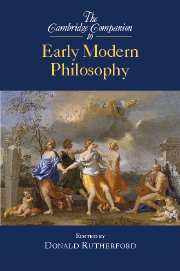Book contents
- Frontmatter
- Introduction
- 1 Innovation and orthodoxy in early modern philosophy
- 2 Knowledge, evidence, and method
- 3 From natural philosophy to natural science
- 4 Metaphysics
- 5 The science of mind
- 6 Language and logic
- 7 The passions and the good life
- 8 The foundations of morality: virtue, law, and obligation
- 9 Theories of the state
- 10 Theology and the God of the philosophers
- 11 Scholastic schools and early modern philosophy
- 12 Toward enlightenment: Kant and the sources of darkness
- Short biographies of major early modern philosophers
- Bibliography
- Index
- Series list
2 - Knowledge, evidence, and method
Published online by Cambridge University Press: 28 January 2007
- Frontmatter
- Introduction
- 1 Innovation and orthodoxy in early modern philosophy
- 2 Knowledge, evidence, and method
- 3 From natural philosophy to natural science
- 4 Metaphysics
- 5 The science of mind
- 6 Language and logic
- 7 The passions and the good life
- 8 The foundations of morality: virtue, law, and obligation
- 9 Theories of the state
- 10 Theology and the God of the philosophers
- 11 Scholastic schools and early modern philosophy
- 12 Toward enlightenment: Kant and the sources of darkness
- Short biographies of major early modern philosophers
- Bibliography
- Index
- Series list
Summary
The understanding of what knowledge consists in, how it is to be secured, the means by which discoveries are to be made, and the means by which purported knowledge is to be legitimated or confirmed were all questions that were disputed intensely in the course of the sixteenth and seventeenth centuries. These disputes were partly the outcome of developments in natural philosophy, but in some cases they lay partly at the source of these developments. They began, in the early sixteenth century, with reflection on Aristotle’s doctrine of method and scientific explanation, but soon turned into increasingly radical revisions to this doctrine. By the beginning of the seventeenth century, they took the form of a search for a wholly new approach, with several different, novel methodological models being advocated. The search for a satisfactory method is not a wholly linear development, however, and two sets of factors serve to overdetermine what is already quite a complex issue. The first turns on the fact that questions of method not only have direct connections to substantive developments in natural philosophy itself, but also to the relation between natural philosophy and the other disciplines (most notably metaphysics and theology), as well as to the question of what kinds of skills and virtues the practitioner of natural philosophy requires. Secondly, questions about the appropriate method for scientific disciplines become translated into questions about the legitimation of the scientific enterprise as a whole.
- Type
- Chapter
- Information
- The Cambridge Companion to Early Modern Philosophy , pp. 39 - 66Publisher: Cambridge University PressPrint publication year: 2006
- 11
- Cited by

